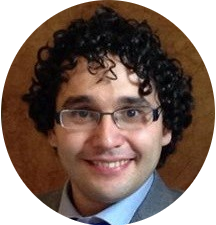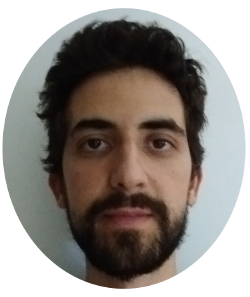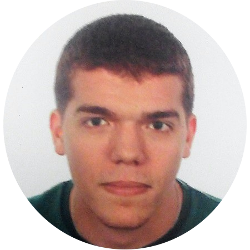UNIVERSIDAD POLITECNICA DE MADRID
Details
 http://www.upm.es
http://www.upm.es
People
 | Eduardo de la Torre He is Associate Professor of Electronics since 2002, and obtained his MSC and PhD degrees in Electrical and Electronic Engineering from Universidad Politécnica de Madrid in 1989 and 2000, respectively. His main expertise is in FPGA-based embedded systems design and, in particular, on partial and dynamic reconfiguration of digital systems and reconfigurable Hardware acceleration. He has been working more than 25 years on digital systems design, among which more than 20 have been around FPGAs, mostly in industrial applications. He has more than 50 papers on reconfigurable systems in the last five years, and around 200 papers overall. He has been General Chair of the DASIP (2014) and ReCoSoC (2017) Conferences, as well as Program Co-Chair of ReCoSoC (2015), ReConFig (2012 and 2013), DASIP (2013), DCIS (2014) and SPIE VLSI Circuits & Systems (2009 and 2011). He is Program Committee member of Conferences such as FPL, ReCoSoC, RAW, WRC, ISVLSI, or SIES. He is also reviewer of numerous Conferences and Journals such as IEEE Transactions on Computers, IEEE Transactions on Industrial Informatics, IEEE Transactions on Industrial Electronics, or Sensor Magazine, Elsevier MICPRO. Currently he is involved in two European funded Projects, Enable-S3 (ECSEL JU) and Cerbero (H2020-ICT) as group leader, as well as a National funded project. All these three projects are on the topic of embedded reconfigurable CPSs, from which the ARTICo3 architecture is being enhanced and refined. |
 | Eduardo Juárez He received his PhD degree from the EPFL in 2003. From 1994 to 1997, he worked as researcher at the Digital Architecture Group of the UPM and was a visiting researcher at the ENST, Brest (France) and the University of Pennsylvania, Philadelphia (USA). From 1998 to 2000, he worked as Assistant at the Integrated Systems Laboratory (LSI) of the EPFL. From 2000 to 2003, he worked as Senior Systems Engineer at the Design Centre of Transwitch Corp. in Switzerland, while continuing his research towards the PhD at the EPFL. In December 2004, he joined the GDEM as a postdoc. Since 2007, he is Assistant Professor at the UPM. His research activity is focused on solving, from a holistic perspective, the power/energy consumption optimization problem of multimedia handheld devices. He is co-author of one book and author or co-author of more than 50 papers and contributions to technical conferences. He has participated in 9 competitive research projects and 18 non-competitive industrial projects. |
 | Teresa Riesgo She born in Madrid, 1965, is Full Professor of Electronics at Universidad Politecnica de Madrid. She got a MSc and PhD from the same university in Industrial Engineering (majoring Electronics). She develops her research activity in the Center of Industrial Electronics of UPM. She has participated in many EU funded projects from ESPRIT to FP7 in many different fields related with electronic design. She has published more than 150 scientific papers in journals and conferences. Her research interests include low power systems, embedded system design reconfigurable applications and wireless sensor networks. |
 | César Sanz He received his PhD degree from the UPM in 1998. From 1985 to 1999 he worked as Assistant Professor and since 1999 he is Associate Professor at the UPM. Currently, he serves as Director of the School of Telecommunications Systems and Engineering. Since 1986, his research activity is focused on electronic design applied to image coding and digital TV. He is co-founder and current director of the GDEM. He is author and/or co-author of 10 books, an international patent and more than 50 papers and contributions to technical conferences. He has participated in 19 research projects and more than 40 industrial projects. |
 | Rubén Salvador He is an Assistant Professor of Electronics at Universidad Politécnica de Madrid (UPM) and researcher at the Center on Software Technologies and Multimedia Systems (CITSEM, UPM). He obtained his MSc/PhD degrees in Electronic Engineering from UPM in 2007/2015. |
 | Alfonso Rodriguez He received the BSc degree in industrial engineering and the MSc degree in industrial electronics from the Universidad Politécnica de Madrid (UPM), Madrid, Spain, in 2012 and 2014, respectively. He is currently a teaching assistant at UPM, and carries out his research activities at Centro de Electrónica Industrial, UPM. Under a HiPEAC collaboration grant, he was visiting researcher in the Computer Engineering Group at Universität Paderborn, where he worked on operating systems for reconfigurable computing. His current research interests include artificial intelligence, high-performance embedded systems, and reconfigurable computing. |
 | Andrés Otero He was born in O Carballiño (Spain) in 1984. He received his M.Sc. degree in Telecommunication Engineering from the University of Vigo, where he graduated with honors in 2007. He received his Master of Research and Ph.D. degrees in Industrial Electronics from Universidad Politécnica de Madrid (UPM), in 2009 and 2014, respectively. In 2011 he was a visiting researcher (4 months) at Politecnico di Milano. From 2014 to 2015 he worked as a research engineer in the Galician Research and Development Center in Advanced Telecommunications (Gradiant), and from 2015 to 2016 he was an Engineer in Gsertel (Televés Group). |
 | Leonardo Suriano He received his bachelor degree in Electronics Engineering (cum Laude) from Polytechnic University of Bari, Italy, in 2007. He started to work as an electronic designer for Industrie Dial Face, 2008, and in the 2009 he became a technical manager of production. |
 | Rafael Zamacola He is currently a Ph.D student in Electrical and Electronic Engineering at Universidad Politecnica de Madrid (UPM). He received his MSc degree in Industrial Engineering from UPM in 2014. |
 | Raquel Lazcano She received her B.Sc. degree in Communication Electronics Engineering from Universidad Politécnica de Madrid (UPM), Spain, in 2014, and her M.Sc. degree in Systems and Services Engineering for the Information Society from Universidad Politécnica de Madrid (UPM), Spain, in 2015. She is currently a student of the PhD degree in Systems and Services Engineering for the Information Society at the Electronic and Microelectronic Design Group (GDEM), UPM. In 2015, she stayed 4 months at the Institute of Electronics and Telecommunications of Rennes (IETR), at the National Institute of Applied Sciences (INSA), France, as an interchange student of the M.Sc. degree. Her research interests include high-performance multicore processing systems, real-time hyperspectral image processing and the automatic optimization of the parallelism in real-time systems. She is author or co-author of 3 indexed journals and 15 contributions to technical conferences. |
 | Daniel Madroñal He received his B.Sc. degree in Communication Electronics Engineering from Universidad Politécnica de Madrid (UPM), Spain, in 2014, and his M.Sc. degree in Systems and Services Engineering for the Information Society from Universidad Politécnica de Madrid (UPM), Spain, in 2015. He is currently a student of the PhD degree in Systems and Services Engineering for the Information Society at the Electronic and Microelectronic Design Group (GDEM), UPM. In 2015, he stayed 4 months at the National Institute of Applied Sciences (INSA), France, as an interchange student of the M.Sc. degree. His research interests include high-performance multicore processing systems, real-time hyperspectral image processing and the automatic optimization of the energy consumption in high-performance systems. He is author or co-author of 3 indexed journals and 15 contributions to technical conferences. |

 © 2017 CERBERO | All Rights Reserved |
Project ID: 732105,
Funded under: H2020-EU.2.1.1. - INDUSTRIAL LEADERSHIP - Leadership in enabling and industrial technologies - Information and Communication Technologies (ICT).
© 2017 CERBERO | All Rights Reserved |
Project ID: 732105,
Funded under: H2020-EU.2.1.1. - INDUSTRIAL LEADERSHIP - Leadership in enabling and industrial technologies - Information and Communication Technologies (ICT).